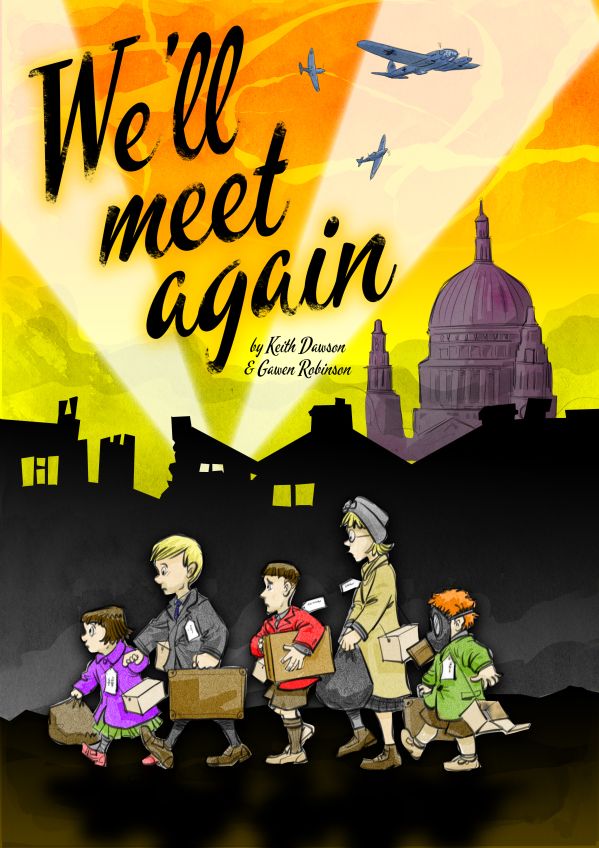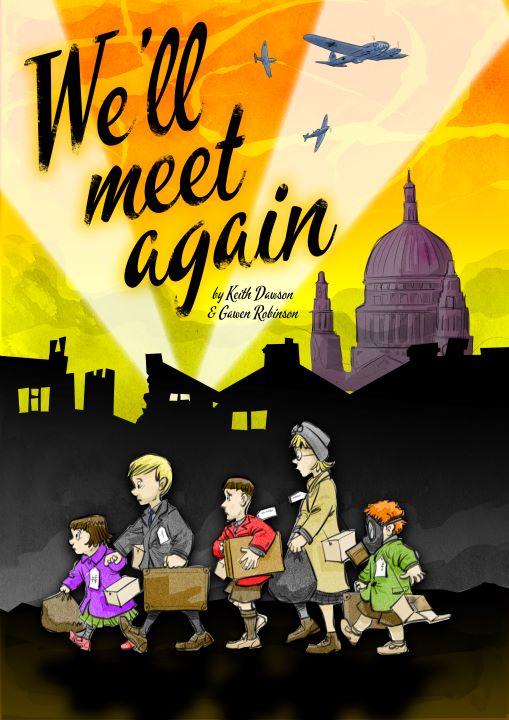
Click HERE to read the Script, look at the Score and listen to the Songs
We'll Meet Again
by Keith Dawson & Gawen Robinson
Pricing & Order Info.
Why choose this Musical?
Editable Word Doc Script available
48 speaking roles
Easily reduced to 36 speaking roles, see "Casting" tab below for full instructions.
Unlimited chorus parts
CDs of Backing Tracks plus Sound Effects available
No pianist required! This CD includes ALL the Backing Tracks, Incidental Music and Special Effects in the order you need them enabling production and direction to take place without specialist musical expertise.
CD of Vocal Tracks (with Sound Effects) available for learning the songs
Sing it! "Karaoke-Style" learning! Check out the video below...
TOP TIP: unmute the video to have a listen and a sing along!
Act out life as an evacuee
National Curriculum: History
Piano/Vocal Score (Grade 6 Standard) available
Take a look at the sample in the "Script & Songs" tab below.
Easily manageable props
Easy to stage: adaptable
Click "Script & Songs" below then click "Production Notes".
Age range: Key Stage 2 Production (7-11 years) - plus optional infant evacuees!
Duration: 55 to 60 minutes
NEW! Instant Scenery with our digital backdrops
A different backdrop for EVERY scene change
Supplied in both a PowerPoint presentation and as individual JPG files.

No more Scenery Painting!
September 1st 1939 saw the start of the biggest and most concentrated mass movement of people in Britain's history. In the four days that followed the government announcement to "Evacuate forthwith", Operation Pied Piper saw nearly three million people transported from towns and cities in danger of enemy attack to places considered safer in the countryside.
The majority were schoolchildren, labelled like luggage, carrying their belongings in a suitcase and their gasmask in a box, accompanied by about 100,000 teachers acting as guardians.
"We'll Meet Again" follows the exploits of a group of children as, initially, they are being prepared at school, just before the outbreak of war, donning gas masks, hearing sirens and being instructed in the safety of the shelters. Following the famous speech by PM Chamberlain, declaring that "We are at war", we see the children at the railway station making their tearful farewells before going on the adventure of a lifetime into the unknown.
All this of course, took place during what was known as the "phoney war", a time when many parents felt that the threat of bombing had been exaggerated. By early 1940, some sixty per cent of children had returned to their homes, something the government hadn't anticipated; after all, the evacuation was a voluntary scheme.
So, after sharing some of their experiences adjusting to life in the countryside, we meet the children back home, bored stiff. Then, as the bombs begin to fall, the decision is made that the children must once more be evacuated to somewhere safe.
Finally, we jump forward to 1945 and VE Day. Children and parents are re-united once more as the show closes with the title song - "We'll Meet Again".
'We'll Meet Again' is a touching production following a group of British children as they try their best to escape from London during the Second World War; it will stir every type of emotion.
The opening scene tugs at your heart strings as wives part from their husbands, and girlfriends from their boyfriends as the men leave to join the armed forces; 'We'll Meet Again' follows. A siren takes you by surprise, and the scene evolves into a classroom where Miss Reynolds and her students keep their spirits high as they sing 'Air Raid.' Eventually, the ear-piercing sound fades out and Miss Reynolds instructs the children to put on their gas masks; some are more successful than others! As the air raid warning sounds again, a reprise of 'Air Raid' is sung.
The following scene occurs at a railway station, and after Chamberlain's speech persuading parents to send their children to the country, a number of interactions between families follow. 'Now it's Time To Say Goodbye' is sung and the emotional exchanges are deep as children are desperate to stay behind. Finally, the children arrange themselves in lines ready to embark on their 'adventure' and 'Now It's Time To Say Goodbye' is reprised.
The arrival of the evacuees in the countryside is uplifting as there is a sense of excitement about the possibilities for the future. The children are handed their rations, and line up in preparation for an inspection for possible 'city nits' and 'dirty ears' and the indignation of the children is comical to watch; during the inspection 'I'll Take That One' is sung by the villagers. A crisis emerges as another group of evacuees enter, just as the villagers thought they had managed to house them all! Amusing dialogue is shared between Barfoot (the billeting officer) and the teacher, both of whom insist the other is in the wrong; eventually the teacher wins the battle.
The following scene sees two evacuees, Terence and Ronald, discuss their new homes with little enthusiasm but try to keep their spirits high during 'Life Goes On.' After a few teasing comments from country kids, the children play together happily whilst an evacuee, Margaret, attempts to write a letter home during 'Dear Mum And Dad.'
A sudden change of atmosphere occurs as the next scene sees the children back at home in London. We find several families gathered together in an Anderson shelter, parents discussing the latest devastation caused by the nightly explosions. Over the sound of an air raid they try to keep the patriotic 'stiff upper lip'. Unfortunately, they are interrupted by the Warden who tells them of a bomb that has landed silently nearby and urges them to evacuate the area as soon as possible. The characters appear disheartened as they realise things can only get worse and are faced with the realisation of having to send their children away again.
However, the audience do not remain saddened for long, as the appearance of a child called Brian welcomes the children to their second home in the Welsh countryside. Unable to understand his accent, the following scene provides some light relief for the audience. The children are quickly welcomed into their new homes, but some are astonished at their new routine, having to share a bath with several other children! It is appropriate that 'Bathnight Blues' should follow.
Luckily, this emotional roller-coaster of a production ends on a high as the cast celebrate the end of the war. Everyone is happy to be back with their families again, and although Terence's life will be different now as his Dad has lost a leg after standing on a land mine, he joins in with the preparations for a VE street party. The stage is full of decorations, smiles and reunions and 'We'll Meet Again' ends the show on a high.
Speaking Roles by number of lines
In the following list, the number shows how many spoken lines each role has. An asterisk (*) before the characters name indicates that this character ALSO has solo or featured sung lines.
| Character Name | Number of Lines |
|---|---|
| Miss Reynolds | 42 |
| Barfoot | 37 |
| Eileen | 30 |
| Terence | 28 |
| Wendy | 28 |
| *Margaret | 27 |
| Mrs Davidson | 23 |
| Kath | 21 |
| Ronald | 20 |
| Mr Roach | 20 |
| Harry | 17 |
| Teacher | 17 |
| Mr Arnold | 15 |
| Mrs Fitzgerald | 15 |
| Alan | 15 |
| ARP Warden | 14 |
| Geoff | 14 |
| Mrs Lloyd | 13 |
| Minister | 11 |
| Ray | 10 |
| Mr Nunn | 10 |
| Brian | 10 |
| Mrs Pugh | 10 |
| Mr Glenister | 9 |
| Bert | 9 |
| Christine | 8 |
| Station Master | 7 |
| Mr Jones | 7 |
| Lil | 6 |
| Mollie | 6 |
| Mrs Howe | 6 |
| Alice | 5 |
| Janet Lightly | 5 |
| Jimmy | 5 |
| Mrs Evans | 5 |
| Tommy | 4 |
| Jack | 4 |
| William | 4 |
| *Villager 1 | 4 |
| *Villager 2 | 4 |
| Jean | 3 |
| Emmie | 3 |
| Mr Townsend | 2 |
| Beryl | 2 |
| *Villager 3 | 1 |
| *Villager 4 | 1 |
| John | 1 |
| Mary | 1 |
Alphabetical Order (with line count)
In the following list, the number shows how many spoken lines each role has. An asterisk (*) before the characters name indicates that this character ALSO has solo or featured sung lines.
| Character Name | Number of Lines |
|---|---|
| Alan | 15 |
| Alice | 5 |
| ARP Warden | 14 |
| Barfoot | 37 |
| Bert | 9 |
| Beryl | 2 |
| Brian | 10 |
| Christine | 8 |
| Eileen | 30 |
| Emmie | 3 |
| Geoff | 14 |
| Harry | 17 |
| Jack | 4 |
| Janet Lightly | 5 |
| Jean | 3 |
| Jimmy | 5 |
| John | 1 |
| Kath | 21 |
| Lil | 6 |
| *Margaret | 27 |
| Mary | 1 |
| Minister | 11 |
| Miss Reynolds | 42 |
| Mollie | 6 |
| Mr Arnold | 15 |
| Mr Glenister | 9 |
| Mr Jones | 7 |
| Mr Nunn | 10 |
| Mr Roach | 20 |
| Mr Townsend | 2 |
| Mrs Davidson | 23 |
| Mrs Evans | 5 |
| Mrs Fitzgerald | 15 |
| Mrs Howe | 6 |
| Mrs Lloyd | 13 |
| Mrs Pugh | 10 |
| Ray | 10 |
| Ronald | 20 |
| Station Master | 7 |
| Teacher | 17 |
| Terence | 28 |
| Tommy | 4 |
| *Villager 1 | 4 |
| *Villager 2 | 4 |
| *Villager 3 | 1 |
| *Villager 4 | 1 |
| Wendy | 28 |
| William | 4 |
Non-speaking roles: Sam, Isobel, Family Group, Chorus of Soldiers, Sailors, Women Children and Teachers.

We'll Meet Again
"School plays are always fun, but this play takes it to a whole other level! With an amazing storyline, fantastic songs and marvelous characters, Me and my sister are both excited for our parents to watch the performance, with me playing Ronald (4 scenes, 4 songs, 20 lines) and my sister playing Mrs Pugh (1 scene, 0 songs, 10 lines). So thank you for creating such an amazing play!"JK, Leyburn Primary School, Leyburn

We'll Meet Again
"Great songs that help educate children and help them enjoy history in a more musical way amazing!"Daniel M, Student, Fawcett Primary School, Trumpington

We'll Meet Again
"At school, I'm never intrested in history BUT when I heard when our year group was going to perform this play at our Leavers Assembly I was so excited. I only play a minor part with 4 lines called 'William'. Anyways, a great production to help educate a child's mind in a fun, and easy way. Who needs lessons when you have this?"Drew Bennett, Quensmead Community Primary School, Leicester, England

We'll Meet Again
"What a wonderful way to show what life was REALLY like for children during World War 2; a term of history lessons in one production."Denise White - Headteacher, Blakenhale Junior School, Birmingham




